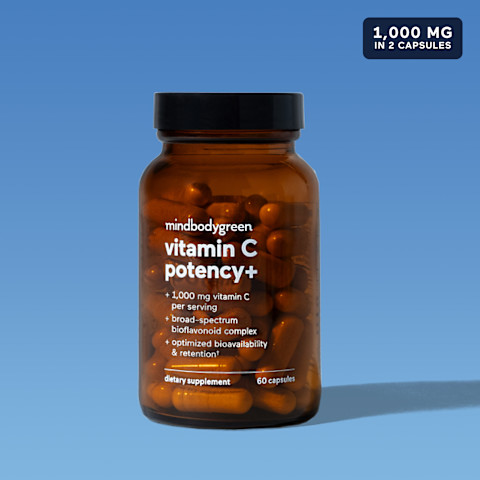
Let's be honest: No serum in the world can mask struggling skin from within. If you're losing sleep regularly, you don't have time to whip up meals with whole and natural foods, or you're skimping on your water intake, it will show on your face.
All this to say: The more you prioritize your internal health, the better your skin will look, and thus, the simpler your topical routine will become. Below, a quick way to do just that for those who want to work smarter, not harder, for glowing skin.
Why you should take supplements for skin health
The secret: Dedicate yourself to the supplement game. Strategically formulated, high-quality supplements can make a huge difference in your complexion—not to mention, the full-body benefits are also worthwhile.
No matter what skin concern you're dealing with, be it bumpy texture, facial flushing, lack of elasticity, a dull complexion, or dry skin, there's a robust formula out there that may be able to help.
Which ingredients to look for
When selecting a supplement for skin health, you should first look at what you want to prioritize and find a beauty supplement with a powerful active or two that addresses your specific concern.
Below, a quick summary of some of the most common skin supplement ingredients and their benefits:
- Collagen: It's the most popular for a reason. Collagen, in the form of hydrolyzed collagen peptides, will support skin elasticity and hydration levels and promote youthful texture1. Plus, research shows that collagen can help support your gut health2, which directly impacts the health of your skin, too. For reference, here are nine A+ collagen supplements to consider adding to cart, all backed by a nutrition Ph.D.
- Ceramides: You can think of ceramides as the building blocks of your skin, keeping it hydrated and plump. While topical creams are certainly helpful, ceramide supplements can contribute to your internal supply, helping to relieve dry skin. Look for beauty supplements with phytoceramides in them (aka, ceramides from plants).
- Vitamin C: Both oral and topical vitamin C (often in the form of vitamin C serums) have been found to support bright and healthy skin3. In fact, according to an observational study from the American Journal of Clinical Nutrition, higher intake of vitamin C is associated with better skin appearance and fewer wrinkles4. This may be due to the fact that your body cannot effectively produce collagen without the antioxidant5.
- Hyaluronic acid: If you've ever used a hyaluronic acid serum, you know the plumping effects are worth the hype. However, you may not be aware that you can take HA in supplement form as well. See, your natural HA levels decline with age6 (like collagen), so you're left with dryer skin as you age. If you replenish your skin with internal HA, your chances of achieving a dewy, plump complexion only rise.
The takeaway
If you want to keep your topical skin care routine simple, then you should invest in skin supplements. Not only will ingredients like collagen, vitamin C, and ceramides help boost the look of your skin, but they also benefit your overall health simultaneously. Ready to shop for more skin supplements? Start here with a list of our favorites.
6 Sources
- https://www.ncbi.nlm.nih.gov/pmc/articles/PMC4206255/
- https://www.ncbi.nlm.nih.gov/pubmed/14600124
- https://www.ncbi.nlm.nih.gov/labs/pmc/articles/PMC3583891/
- https://academic.oup.com/ajcn/article/86/4/1225/4649573?login=false
- https://lpi.oregonstate.edu/mic/health-disease/skin-health/vitamin-C
- https://www.jaad.org/article/S0190-9622(16)00202-4/fulltext#:~:text=The%20skin's%20hyaluronic%20acid%20(HA,of%20fine%20lines%20and%20wrinkles.

